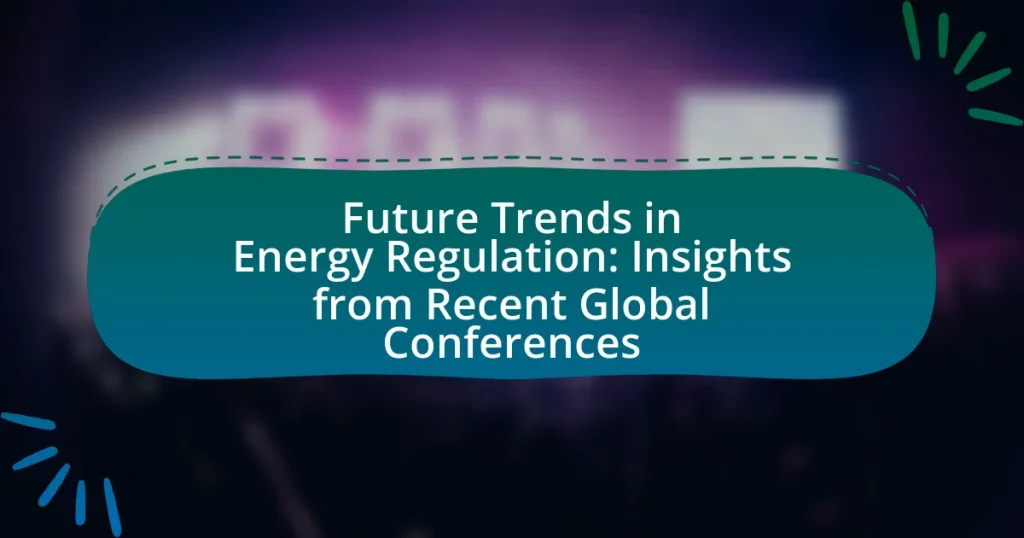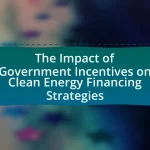The article focuses on future trends in energy regulation, emphasizing the integration of renewable energy sources, enhanced grid flexibility, and decarbonization efforts. It highlights the role of global conferences, such as the United Nations Climate Change Conferences, in shaping regulatory frameworks and promoting international collaboration on sustainable energy practices. Key topics discussed include carbon pricing mechanisms, energy efficiency standards, and the influence of cultural and economic factors on regulatory responses. The article also addresses the challenges regulators face, such as political resistance and the need for adaptive frameworks, while proposing best practices for stakeholder collaboration and compliance to enhance the effectiveness of energy regulations.
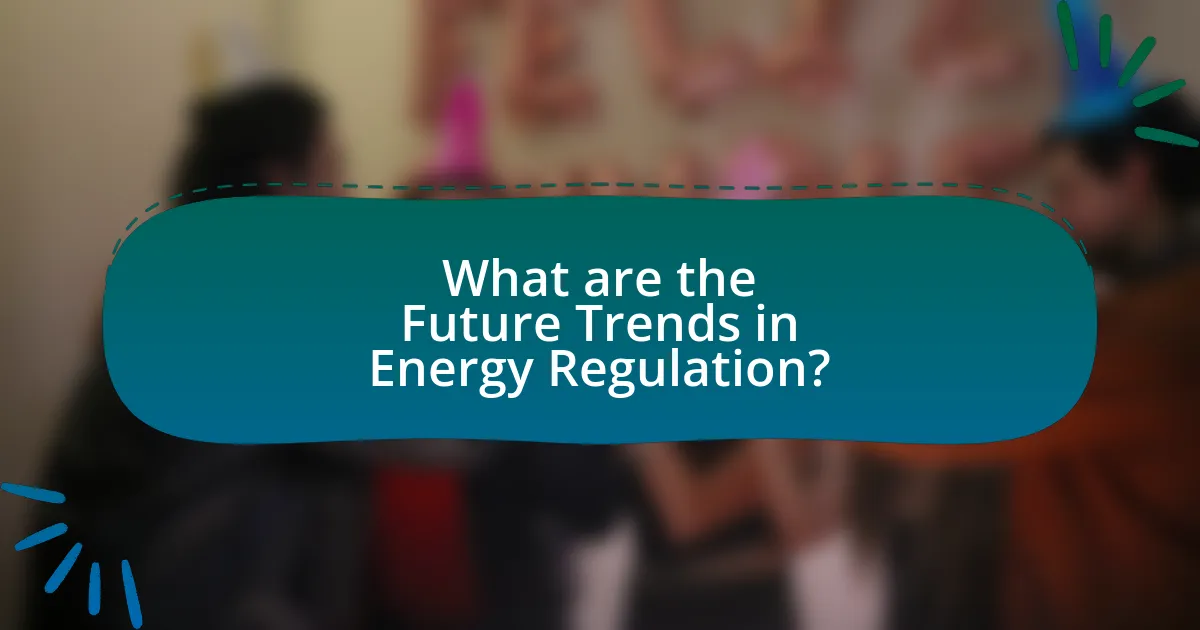
What are the Future Trends in Energy Regulation?
Future trends in energy regulation include increased integration of renewable energy sources, enhanced grid flexibility, and a focus on decarbonization. Regulatory frameworks are evolving to accommodate the growing share of renewables, with policies promoting energy storage and demand response mechanisms. For instance, the International Energy Agency reported that global renewable energy capacity reached 2,799 GW in 2020, highlighting the need for regulations that support this transition. Additionally, many countries are implementing carbon pricing and emissions trading systems to incentivize reductions in greenhouse gas emissions, aligning with international climate agreements like the Paris Accord. These trends indicate a shift towards more adaptive and sustainable regulatory approaches in the energy sector.
How are global conferences shaping energy regulation trends?
Global conferences are significantly shaping energy regulation trends by facilitating international collaboration and establishing common frameworks for policy development. These conferences, such as the United Nations Climate Change Conferences (COP), bring together policymakers, industry leaders, and scientists to discuss and negotiate strategies for sustainable energy practices. For instance, the Paris Agreement, established during COP21 in 2015, set binding commitments for countries to reduce greenhouse gas emissions, influencing national energy policies worldwide. Additionally, the discussions and agreements reached at these conferences often lead to the adoption of innovative regulatory approaches, such as carbon pricing and renewable energy incentives, which are increasingly being integrated into national legislation. This collaborative environment fosters the sharing of best practices and technological advancements, further driving the evolution of energy regulations globally.
What key topics are discussed at these global conferences?
Key topics discussed at global conferences on future trends in energy regulation include renewable energy integration, carbon pricing mechanisms, energy efficiency standards, and regulatory frameworks for emerging technologies. These conferences often focus on the transition to sustainable energy systems, emphasizing the need for policies that support innovation and investment in clean energy solutions. For instance, discussions frequently highlight the importance of international cooperation in achieving climate goals, as evidenced by commitments made during events like the COP climate summits, where nations outline their strategies for reducing greenhouse gas emissions.
How do these discussions influence policy changes?
Discussions at global conferences on energy regulation significantly influence policy changes by facilitating the exchange of innovative ideas and best practices among stakeholders. These dialogues often lead to the identification of emerging trends, such as the shift towards renewable energy sources and the implementation of stricter emissions standards. For instance, the 2021 United Nations Climate Change Conference (COP26) resulted in commitments from various countries to enhance their climate action plans, demonstrating how collaborative discussions can directly shape national policies. Additionally, the consensus reached during these conferences often serves as a framework for countries to align their regulations with international standards, thereby accelerating the adoption of progressive energy policies.
Why is energy regulation important for sustainable development?
Energy regulation is crucial for sustainable development because it ensures the efficient use of resources, promotes renewable energy adoption, and minimizes environmental impacts. Effective energy regulation establishes standards and policies that guide energy production and consumption, facilitating a transition to cleaner energy sources. For instance, the International Energy Agency reported that countries with robust energy regulations have seen significant increases in renewable energy investments, which are essential for reducing greenhouse gas emissions and combating climate change. By creating a stable regulatory framework, governments can encourage innovation and attract investments in sustainable technologies, ultimately supporting long-term economic growth and environmental sustainability.
What role does energy regulation play in combating climate change?
Energy regulation plays a crucial role in combating climate change by establishing frameworks that promote the transition to renewable energy sources and reduce greenhouse gas emissions. Regulatory measures, such as emissions standards and renewable energy mandates, incentivize the adoption of cleaner technologies and discourage reliance on fossil fuels. For instance, the implementation of the European Union’s Renewable Energy Directive aims for at least 32% of energy consumption to come from renewable sources by 2030, significantly contributing to emission reductions. Additionally, energy regulations can facilitate investments in energy efficiency and innovation, further supporting climate goals.
How does effective regulation support renewable energy adoption?
Effective regulation supports renewable energy adoption by creating a stable and predictable environment for investment and development. Regulations such as feed-in tariffs, renewable portfolio standards, and tax incentives encourage private sector investment by ensuring a guaranteed return on investment and reducing financial risks. For instance, countries like Germany and Denmark have successfully implemented such regulations, leading to significant increases in renewable energy capacity, with Germany generating over 40% of its electricity from renewable sources in 2019. This regulatory framework not only fosters innovation and competition but also aligns with global climate goals, as evidenced by commitments made during international conferences like the Paris Agreement, which emphasize the need for supportive policies to transition to sustainable energy systems.
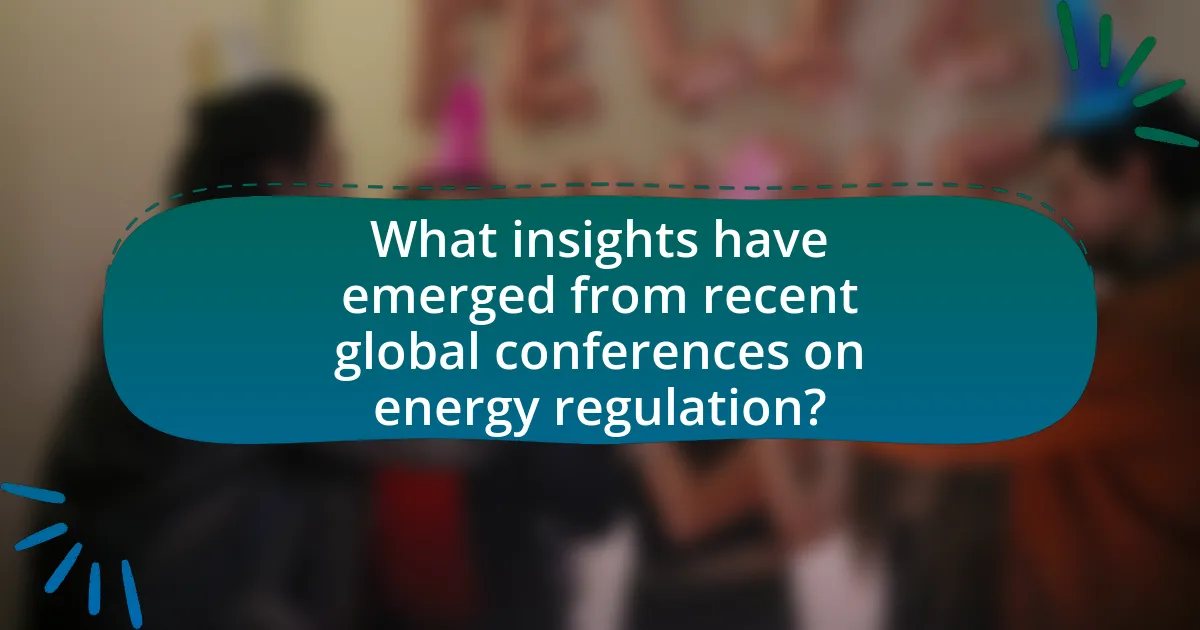
What insights have emerged from recent global conferences on energy regulation?
Recent global conferences on energy regulation have highlighted the urgent need for harmonized regulatory frameworks to facilitate the transition to renewable energy sources. These conferences have underscored the importance of international collaboration in establishing standards that promote sustainability and reduce carbon emissions. For instance, the International Energy Agency reported that countries adopting unified regulations can accelerate the deployment of clean technologies, which is critical for meeting global climate targets. Additionally, discussions have emphasized the role of digitalization and data sharing in enhancing regulatory efficiency, enabling better monitoring of energy consumption and emissions.
What were the major takeaways from the latest conferences?
The major takeaways from the latest conferences on future trends in energy regulation include a strong emphasis on the transition to renewable energy sources, the importance of regulatory frameworks that support innovation, and the need for international collaboration to address climate change. Specifically, discussions highlighted that countries are increasingly adopting policies to incentivize solar and wind energy, with over 100 nations committing to net-zero emissions by 2050. Additionally, experts noted that regulatory bodies must adapt to technological advancements, such as smart grids and energy storage solutions, to enhance efficiency and reliability in energy systems. Finally, the conferences underscored the necessity of global partnerships, as evidenced by initiatives like the Paris Agreement, which aims to unify efforts in combating climate change across borders.
How do these takeaways reflect current global energy challenges?
The takeaways from recent global conferences on energy regulation highlight the urgent need for sustainable energy solutions to address current global energy challenges. These challenges include the increasing demand for energy, the necessity to reduce greenhouse gas emissions, and the transition from fossil fuels to renewable energy sources. For instance, the International Energy Agency reported that global energy demand is expected to rise by 30% by 2040, necessitating significant investment in clean energy technologies. Additionally, the conferences emphasized the importance of international cooperation and regulatory frameworks to facilitate the transition, reflecting the interconnected nature of energy markets and climate goals. This alignment of regulatory insights with pressing energy issues underscores the critical role of policy in shaping a sustainable energy future.
What innovative regulatory approaches were proposed?
Innovative regulatory approaches proposed include the implementation of performance-based regulations and flexible regulatory frameworks that adapt to technological advancements. Performance-based regulations focus on achieving specific outcomes rather than prescribing methods, allowing for innovation in energy solutions. Flexible regulatory frameworks enable regulators to adjust policies in response to emerging technologies and market dynamics, fostering a more responsive energy sector. These approaches were discussed at global conferences, highlighting the need for regulations that support sustainability and efficiency in energy systems.
How are different countries responding to these insights?
Different countries are responding to insights from recent global conferences on energy regulation by implementing policies aimed at enhancing sustainability and reducing carbon emissions. For instance, the European Union has introduced the Green Deal, which aims to make Europe the first climate-neutral continent by 2050, reflecting a commitment to ambitious climate targets. Similarly, the United States has rejoined the Paris Agreement and is focusing on transitioning to renewable energy sources, as evidenced by the Biden administration’s infrastructure plan that allocates significant funding for clean energy projects. In Asia, countries like Japan and South Korea are investing in hydrogen technology and renewable energy infrastructure, aligning with global trends towards decarbonization. These actions demonstrate a collective shift towards more stringent energy regulations and a commitment to addressing climate change on a global scale.
What regulatory frameworks are being adopted globally?
Countries are increasingly adopting regulatory frameworks focused on sustainability, carbon neutrality, and renewable energy integration. For instance, the European Union’s Green Deal aims to make Europe the first climate-neutral continent by 2050, implementing regulations that promote renewable energy sources and reduce greenhouse gas emissions. Similarly, the United States has seen states like California adopt stringent emissions standards and renewable portfolio standards to drive clean energy adoption. Additionally, the International Energy Agency has highlighted the importance of frameworks that support energy efficiency and innovation in energy technologies, emphasizing the need for global cooperation in regulatory approaches. These frameworks are essential for addressing climate change and transitioning to sustainable energy systems.
How do cultural and economic factors influence these responses?
Cultural and economic factors significantly influence responses to energy regulation by shaping public perception, policy priorities, and investment strategies. For instance, cultures that prioritize environmental sustainability tend to support stricter regulations on emissions and renewable energy adoption, as seen in Scandinavian countries where public opinion strongly favors green policies. Economically, regions with abundant fossil fuel resources may resist stringent regulations to protect local industries, as evidenced by the United States’ varied state-level responses to federal climate initiatives. These dynamics illustrate how cultural values and economic interests can either align with or oppose regulatory efforts in the energy sector.
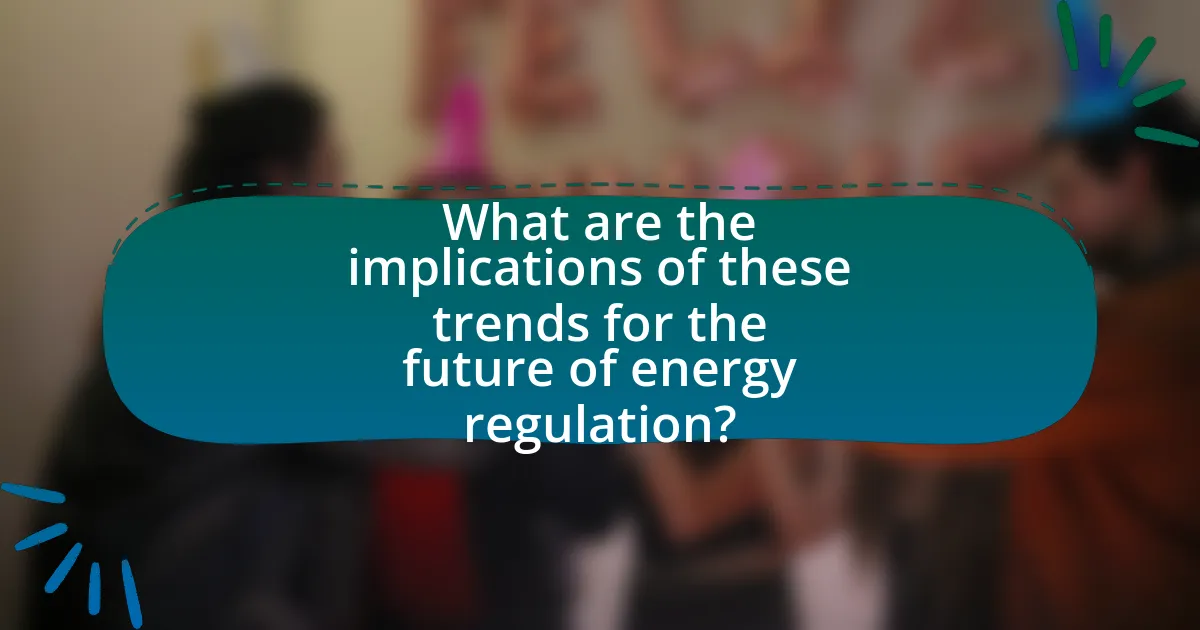
What are the implications of these trends for the future of energy regulation?
The implications of current trends for the future of energy regulation include a shift towards more flexible, decentralized energy systems that prioritize renewable sources and consumer participation. As global conferences highlight the urgency of climate change, regulatory frameworks are increasingly adapting to support the integration of renewable energy technologies, such as solar and wind, which accounted for approximately 90% of new power capacity additions in 2020 according to the International Renewable Energy Agency. This transition necessitates regulations that facilitate energy storage solutions, demand response programs, and grid modernization to enhance reliability and efficiency. Additionally, the rise of digital technologies and data analytics in energy management will require regulators to establish guidelines that ensure data privacy and security while promoting innovation.
How might these trends affect energy consumers?
Energy consumers may experience increased costs and greater variability in pricing due to trends in energy regulation. As governments implement stricter environmental policies and transition towards renewable energy sources, the costs associated with these changes are likely to be passed on to consumers. For instance, a report from the International Energy Agency indicates that investments in renewable energy infrastructure can lead to higher initial costs, which may be reflected in consumer energy bills. Additionally, as energy markets become more competitive and dynamic, consumers may face fluctuating prices based on supply and demand, impacting their overall energy expenses.
What changes can consumers expect in energy pricing and availability?
Consumers can expect fluctuations in energy pricing and availability due to ongoing shifts in regulatory frameworks and market dynamics. Recent global conferences have highlighted a trend towards increased reliance on renewable energy sources, which may lead to lower long-term prices as technology advances and production scales up. For instance, the International Energy Agency reported that the cost of solar energy has decreased by over 80% since 2010, indicating a potential for more affordable energy options in the future. Additionally, regulatory changes aimed at enhancing energy efficiency and reducing carbon emissions may also impact pricing structures, as governments incentivize cleaner energy solutions. These developments suggest that consumers will experience both variability in energy costs and improved access to sustainable energy sources in the coming years.
How will consumer rights be impacted by new regulations?
New regulations will enhance consumer rights by increasing transparency and accountability in the energy sector. These regulations often mandate clearer disclosures about pricing, service terms, and environmental impacts, empowering consumers to make informed choices. For instance, the implementation of the European Union’s Clean Energy for All Europeans package has strengthened consumer protections by promoting energy efficiency and enabling easier switching between energy providers. This shift not only fosters competition but also ensures that consumers have access to fair pricing and reliable services, ultimately enhancing their rights in the energy market.
What challenges do regulators face in implementing these trends?
Regulators face significant challenges in implementing future trends in energy regulation, primarily due to the rapid pace of technological advancements and the need for updated regulatory frameworks. The integration of renewable energy sources, such as solar and wind, requires regulators to adapt existing policies to accommodate decentralized energy production and ensure grid reliability. Additionally, the complexity of coordinating between various stakeholders, including private companies, government entities, and consumers, complicates the regulatory process. For instance, the International Energy Agency reported that regulatory uncertainty can hinder investment in clean energy technologies, which is crucial for achieving climate goals. Furthermore, the evolving nature of energy markets, driven by digitalization and data analytics, necessitates continuous training and capacity building for regulators to effectively oversee these changes.
What are the barriers to effective energy regulation?
Barriers to effective energy regulation include political resistance, lack of technical expertise, and insufficient funding. Political resistance often arises from conflicting interests among stakeholders, which can hinder the implementation of necessary regulations. A study by the International Energy Agency highlights that regulatory frameworks are frequently undermined by political instability and lobbying from powerful energy sectors. Additionally, a lack of technical expertise within regulatory bodies can lead to ineffective oversight and enforcement of energy policies, as noted in research published by the World Bank. Insufficient funding further exacerbates these issues, limiting the capacity of regulatory agencies to conduct necessary research and implement programs effectively.
How can regulators overcome these challenges?
Regulators can overcome challenges in energy regulation by adopting adaptive regulatory frameworks that promote innovation and flexibility. These frameworks allow for the integration of new technologies and business models, which are essential in a rapidly evolving energy landscape. For instance, the International Energy Agency (IEA) emphasizes the need for regulators to facilitate the transition to renewable energy sources by implementing policies that support grid modernization and decentralized energy systems. Additionally, collaboration among stakeholders, including governments, industry players, and consumers, is crucial for developing comprehensive strategies that address regulatory hurdles. This collaborative approach has been highlighted in various global conferences, such as the Clean Energy Ministerial, where best practices and successful case studies are shared to inform regulatory improvements.
What best practices can be adopted from recent insights?
Best practices that can be adopted from recent insights in energy regulation include enhancing stakeholder engagement, implementing adaptive regulatory frameworks, and prioritizing sustainability. Stakeholder engagement fosters collaboration among governments, industry, and communities, which has been shown to improve policy outcomes, as evidenced by the success of initiatives discussed at the 2023 International Energy Conference. Adaptive regulatory frameworks allow for flexibility in response to technological advancements and market changes, a strategy highlighted in the 2022 Global Energy Transition Report, which emphasizes the need for regulations to evolve alongside innovations. Prioritizing sustainability aligns with global climate goals, as demonstrated by commitments made during the 2023 Climate Action Summit, where countries pledged to integrate renewable energy sources into their regulatory frameworks.
How can stakeholders collaborate to enhance energy regulation?
Stakeholders can collaborate to enhance energy regulation by establishing multi-sector partnerships that facilitate knowledge sharing and joint decision-making. These partnerships can include government agencies, private sector companies, non-governmental organizations, and community groups, all working together to create comprehensive regulatory frameworks. For instance, the International Energy Agency emphasizes the importance of stakeholder engagement in developing policies that reflect diverse perspectives and expertise, which can lead to more effective and adaptive energy regulations. Additionally, collaborative platforms, such as public consultations and stakeholder forums, allow for the integration of various viewpoints, ensuring that regulations are not only technically sound but also socially acceptable and economically viable.
What strategies can be employed to ensure compliance and effectiveness?
To ensure compliance and effectiveness in energy regulation, implementing a robust framework of stakeholder engagement, continuous monitoring, and adaptive policy-making is essential. Stakeholder engagement fosters collaboration among regulators, industry players, and the public, which enhances transparency and accountability. Continuous monitoring allows for real-time assessment of compliance with regulations, enabling timely interventions when necessary. Adaptive policy-making ensures that regulations evolve in response to technological advancements and market changes, maintaining relevance and effectiveness. For instance, the International Energy Agency emphasizes the importance of stakeholder collaboration and adaptive strategies in its reports on energy policy effectiveness, highlighting that countries with strong stakeholder engagement tend to achieve better compliance outcomes.
